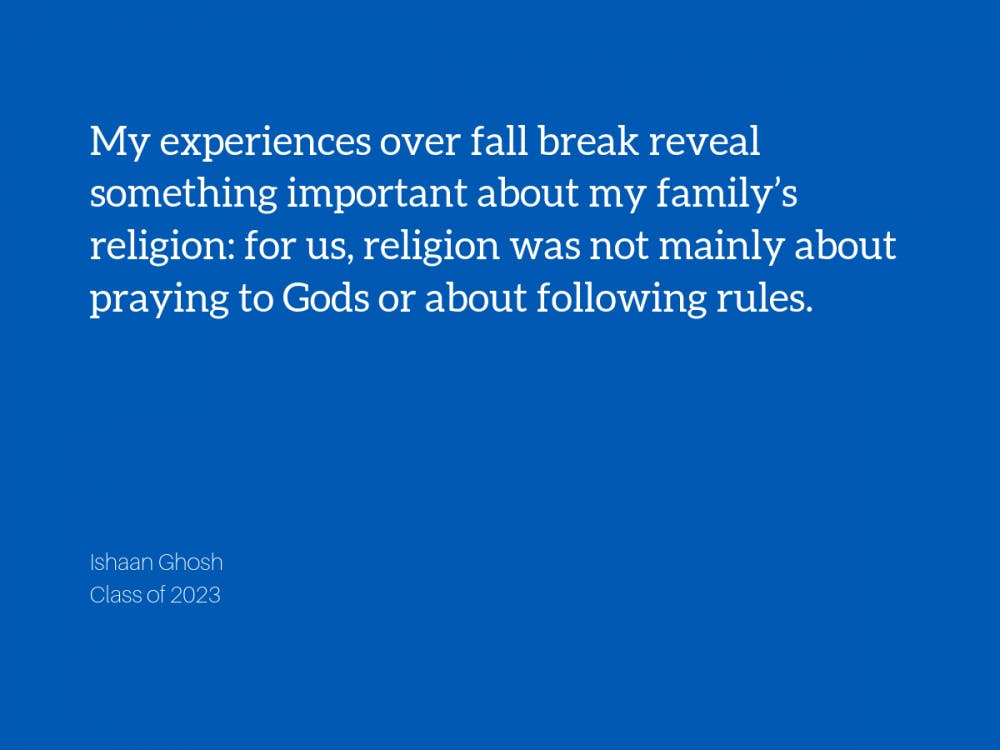The motto of Duke University is eruditio et religio, which means “learning and religion.” This motto is an important part of how the founders of Duke viewed the University’s mission but students today differ in the extent to which they follow the words of the motto. Some focus exclusively on the eruditio, working on their studies while not worrying about religion. Others are active in religious life and identify strongly with one of the many religious groups on campus. For me, on the other hand, religion was at times a confusing part of my life, and I came to Duke not really sure where I fit in the mosaic of religious traditions on campus.
When people ask me what my religion is, I say that I am a Hindu. While growing up in Atlanta, I generally attended Hindu festivals and went to Hindu temples. But I also identified with Christianity, the religion of most of my friends, if they had any religion at all. Atheism was also common among the people I spent time with and there were some areas where my understanding of science conflicted with what any religious tradition around me said. For example, is it possible to be Christian and simultaneously believe in the Theory of Evolution? Since at least middle school I felt somewhat connected to both Christianity and Hinduism, but separated from both of them as well.
I brought this religious ambiguity with me when I came to Duke. I have not been here long enough to say if my time at Duke has radically changed my outlook on religion, or on anything else. However, I think that I came a little bit closer to understanding my own relationship to religion over fall break, where I went to a Hindu celebration called Durga Puja back home in Atlanta.
I have attended Durga Pujas all my life, but the fact that it was happening that week did not even occur to me until the day it actually happened. The ceremony itself took place in a converted high school cafeteria in Gwinnett County, more than an hour from our home. I listened to the drumming and the blowing of the conch shell, and I briefly admired the decorated idols.
I attended an “Anjali” service. This consists of clutching some petals in your hands and repeating a long list of Sanskrit words, most of whose meanings we did not understand, after the priest. I was hungry, impatient for dinner to begin. The priest was talking too fast; I barely had time to pronounce the longer Sanskrit words before he moved on to the next word. I did not feel especially holy or connected to God.
However, the evening wasn’t done after the Anjali. After the ceremony and a very spicy dinner, there was a performance by a well-known Bengali pop star from my parents’ generation. He sang songs in Bengali which had nothing to do with religion (including a bilingual cover of Louis Armstrong’s “What a Wonderful World”). Many of the audience members, sang along with his songs. They were clearly enjoying themselves and excited about the prospect of hearing in person someone who was a major celebrity when they were younger. It was clear that for at least some of the people there, including my parents, the main attraction was the singer, not the ceremony. I heard my mother talking about the singer before we even got to the celebration.
This reveals something important about my family’s religion: for us, religion was not mainly about praying to Gods or about following rules. We rarely go to the Hindu Temple, and we do not follow Hindu dietary restrictions. For my family, Hinduism is largely about remembering our past and about celebrating our heritage as Indians and members of the Bengali ethnic group.
That is not to say that there was no spiritual aspect of my family’s religion: my parents kept a statue of Ganesh above their bedroom door when I was a kid, and they taught me to make a gesture of apology to Saraswati, goddess of learning, whenever I inadvertently stepped on a book. But for the most part, our observances of Hinduism occurred either on events of family significance, such as birthdays of deceased relatives, or on occasions which allowed opportunities to engage with the Bengali community, such as Durga Puja.
Understanding this reminds us that religion can come from many places. But I feel this can also help explain my religious confusion growing up. My religious feeling as a Hindu was weak not only because my family’s relative lack of religiosity, but also because Hinduism was tied to my Indian and Bengali identity. And living in a neighborhood that was eighty-five percent white and where I had exactly one Indian friend in middle school, my Indian identity was not that strong either.
I don’t want to imply that my family’s religion is defective or somehow inferior to other types of religion. Many people are perfectly happy and comfortable seeing religion primary as a vehicle for social or ethnic identity. In my case, however, the religion of my childhood left plenty of space for spiritual confusion. Confusion, though, can be an opportunity. Here at Duke, I will have lots of opportunities to explore my religion. This includes not just the spiritual aspect of religion, but also the communal part: what it is like to be part of a community of faith and connection. I have already begun to expand my religious horizons, attending several Christian and Jewish services.
I do not know the future; it is possible that my entire life will be defined by religious confusion. At Duke, however, it is possible that I can more fully explore both halves of our motto: developing my own religion while learning at a great university.
Ishaan Ghosh is a Trinity first-year. His column runs on alternate Tuesdays.
Get The Chronicle straight to your inbox
Signup for our weekly newsletter. Cancel at any time.

